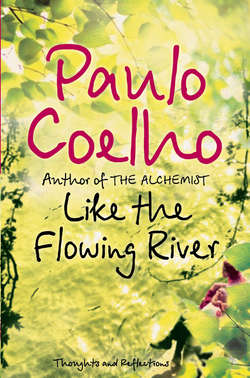Читать книгу Like the Flowing River: Thoughts and Reflections - Пауло Коэльо - Страница 12
In a Bar in Tokyo
ОглавлениеThe Japanese journalist asks the usual question: ‘Who are your favourite writers?’
And I give my usual answer: ‘Jorge Amado, Jorge Luis Borges, William Blake and Henry Miller.’
The interpreter looks at me in amazement:
‘Henry Miller?’
Then she realizes that it is not her role to ask questions, and she carries on interpreting. At the end of the interview, I ask her why she was so surprised by my response. Was it perhaps because Henry Miller is not considered to be ‘politically correct’? He was someone who opened up a vast world for me, and his books have an energy and a vitality rarely found in contemporary literature.
‘No, I’m not criticizing Henry Miller. I’m a fan of his too,’ she said. ‘Did you know that he was married to a Japanese woman?’
Of course I knew. I’m not ashamed to be enough of a fan to want to find out everything about a writer and his life. I went to a book fair once just to meet Jorge Amado; I travelled forty-eight hours in a bus to meet Borges (and it was my fault that I didn’t, because when I saw him, I froze and couldn’t say a word); I rang the bell of John Lennon’s apartment in New York (the doorman asked me to leave a letter explaining the reason for my visit and said that John Lennon would phone me, but he never did); I had plans to go to Big Sur to see Henry Miller, but he died before I had saved enough money for the trip.
‘The Japanese woman is called Hoki,’ I said proudly. ‘I also know that there is a museum of his watercolours in Tokyo.’
‘Would you like to meet her tonight?’
What a question! Of course I would like to meet someone who once lived with one of my idols. I imagine she must receive visitors and requests for interviews from all over the world; after all, she lived with Miller for nearly ten years. Surely she won’t want to waste her time on a mere fan? But if the translator says it’s possible, I had better take her word for it – the Japanese always keep their word.
I spend the rest of the day anxiously waiting. We get into a taxi, and everything starts to seem very strange. We stop in a street where the sun probably never shines, because a railway viaduct passes right over it. The translator points to a second-rate bar on the second floor of a crumbling building.
We go up some stairs, enter a deserted bar, and there is Hoki Miller.
To conceal my surprise, I exaggerate my enthusiasm for her ex-husband. She takes me to a room in the back, where she has created a little museum – a few photos, two or three signed watercolours, a book with a dedication written in it, and nothing more. She tells me that she met him when she was studying for an MA in Los Angeles and that, in order to make ends meet, she used to play piano in a restaurant and sing French songs (in Japanese). Miller had supper there once and loved the songs (he had spent much of his life in Paris); they went out a few times, and he asked her to marry him.
I see that there is a piano in the bar – as if she were returning to the past, to the day when they first met. She tells me some wonderful stories about their life together, about the problems that arose from the difference in their ages (Miller was over fifty, and Hoki not yet twenty), about the time they spent together. She explains that the heirs from his other marriages inherited everything, including the rights to the books, but that this didn’t matter because the experience of being with him outweighed any monetary compensation.
I ask her to play the same song that first caught Miller’s attention all those years ago. She does this with tears in her eyes, and sings ‘Autumn Leaves’ (‘Feuilles mortes’).
The translator and I are moved too. The bar, the piano, the voice of that Japanese woman echoing through the empty room, not caring about the success of the other exwives, or the rivers of money that must flow from Miller’s books, or the international fame she could be enjoying now.
‘There was no point in squabbling over the inheritance: love was enough,’ she said at last, sensing what we were feeling. Yes, in the light of that complete absence of bitterness or rancour, I think love really was enough.
